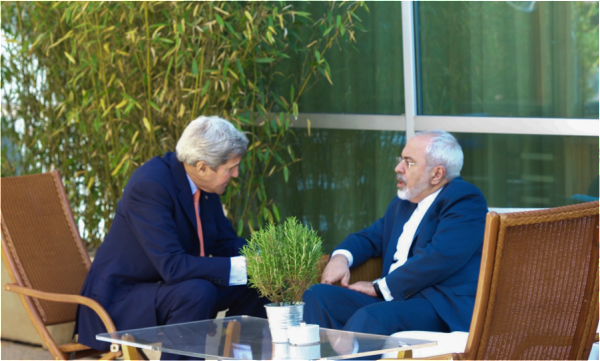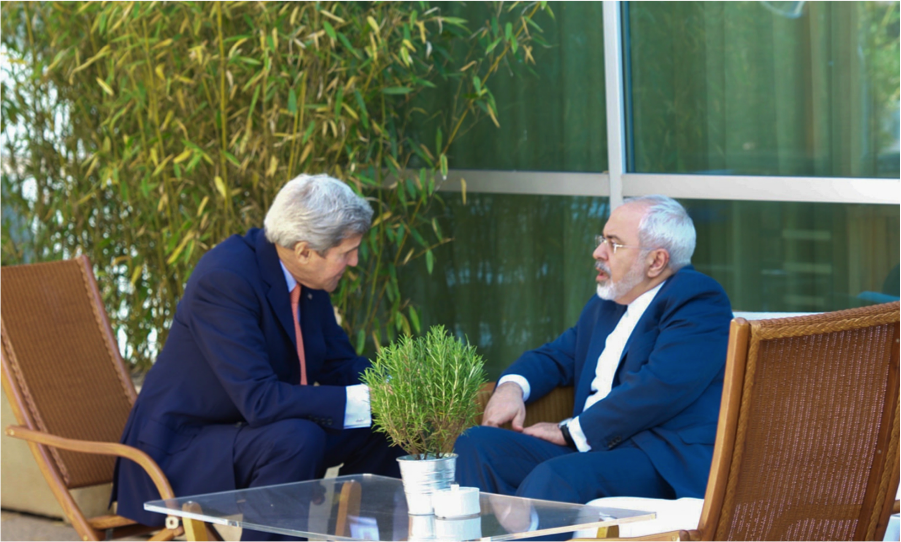
Image from warontherocks.com
Iran has been one of America’s greatest geopolitical enemies since the 1979 revolution that established that nation’s current government. America’s distrust of Iran results from Tehran’s funding of international terrorism, it’s arming of the Iraqi insurgency during the Iraq War, the threat it poses to Israel, and the bitter memory of the Iran Hostage Crisis. Iranians officials dislike the United States because the US backed Iraq in the Iran-Iraq War of the 1980s and because America shot down an Iranian passenger airliner in 1988. The Iranian government also exaggerates America’s role in the fall of Prime Minister Mohammad Mossadegh in 1953. Despite the mutual antagonism, Iran and the US reached a historic nuclear agreement in July 2015. Optimists suggest that this deal is the beginning of a rapprochement between the two countries. Even if this is achieved, there are important players to consider, like Saudi Arabia and Israel, key American allies. The vendetta is deciding if rapprochement with Iran is possible, and weighing it against our other interests in the region.
The possibility of a nuclear Iran is among the greatest threats to American national security and regional stability. A nuclear Iran could blackmail the United States, pose an existential threat to Israel, and produce a nuclear arms race between Sunni and Shia countries in the least stable region of the world. If the Nuclear Deal is a success, it will rank as one of President Obama’s greatest achievements, on par with Nixon going to China. The deal will be implemented by Obama’s successor, who has the power to repudiate the historic agreement. It will not be in America’s interest for this to happen. Rejecting the deal would be a modern-day equivalent of America’s failure to join the League of Nations in 1919.
The deal requires that Iran surrender 97% of its enriched uranium and all but five thousand of its centrifuges, not enough to build a bomb.[1] It would take Iran a year to build a nuclear bomb if it were to decide to violate the deal.[2] Secretary Kerry secured thorough inspections by the International Atomic Energy Agency, which will verify that Iran does not take the steps necessary to produce a nuclear weapon. We should not be naïve about Iran’s change in behavior. Many, including foreign policy expert Ian Bremmer, “do not expect the Iranians [are] going to hold firm on their commitments.”[3] Although the success of the deal is in the world’s best interest, the US must not rule out other options should it fail. This includes the possibility of military force. However, since a war against Iran would be costly, it should be the last resort.
The Nuclear Deal, and the possibility of a rapprochement with Iran, inevitably affects America’s relationships with its Middle Eastern partners. Saudi Arabia is Iran’s mortal enemy and is the greatest obstacle to Iran’s regional domination. It is key in America’s regional strategy, but the American-Saudi relationship is one of convenience and not much else. If America cooperates with Iran, it will weaken its relationship with the Saudis. That is an acceptable risk. Iran has a consumer market of eighty million people. The international sanctions that brought Iran to the negotiating table cut off its economy from the entire world. As it reenters the system of trade, banking, and finance, the Iranian population will grow in wealth and want to buy Western goods.[4] Should Iran join the world economy, the price of oil will fall, hurting not only the Saudis, but also Russia and Venezuela.[5] Iran, a Shia country, will also be more eager than the Sunni Saudis in combating ISIS. Neither nation has a good human rights record, so that should not be a major consideration if America has to choose to ally itself with one country or the other.
A more pressing issue is the direction Israeli-American relations will take following the Nuclear Deal. It is critical that the United States stands by Israel and does everything in its power to ensure Israel’s national survival is not threatened. America cannot become true partners with Iran until Iran acknowledges Israel’s right to exist. The US should continue to undermine Hezbollah and Hamas, terrorist groups funded by Iran. That does not mean that America cannot pursue its interests. We do not need to worry about a breach in the American-Israeli relationship. The two nations will not let their disagreement about the Iran Deal disrupt their collaboration against mutual enemies. What other country will Israel turn to for the help if not the United States?[6]
This deal solves one issue; it does not repair the entire American-Iranian relationship. Iran “has some growing up it needs to do it if truly wants to be taken seriously on Middle East matters.”[7] Iran will have to stop taking hostages like Jason Rezaian, an American journalist, stop funding terrorism, curb its human rights abuses, and curb its anti-American and anti-Israeli rhetoric if it wants to play a constructive role in the region. One threat to the rapprochement is that its revolutionary ideology is vital to Iran’s identity. However, the maturing generation does not remember the 1979 Revolution. Plus, despite their rhetoric, Iranian leaders are surprisingly pragmatic when making geopolitical calculations. The Nuclear Deal could empower the Iranian moderates in directing the nation’s foreign policy. Together, America and Iran could work to solve the war in Syria and defeat ISIS. There is nothing in America’s power that could do more to stabilize the Middle East than rapprochement with Iran, which may encourage Iran to become a moderate country.
Take action:
By signing this petition that supports the Nuclear Deal with Iran
———————————————————————————————————————-
Sources:
[1] “How the Iran Nuclear Deal Works, Explained in 3 Minutes.” YouTube. Vox, 15 July 2015. Web. 20 Nov. 2015.
[2] “The Historic Deal That Will Prevent Iran from Acquiring a Nuclear Weapon.” The White House. The White House. Web. 24 Nov. 2015.
[3] Bremmer, Ian. “Ian Bremmer on Why the Iran Deal Is about Much More than Nuclear Weapons.” Vox. 14 July 2015. Web. 24 Nov. 2015.
[4] Bremmer, Ian. “Will Iran Become America’s New Saudi Arabia?” The National Interest. 27 July 2015. Web. 24 Nov. 2015.
[5] Bremmer, Ian. “Iran Is America’s Real Middle East Priority.” Ian Bremmer RSS. 6 Sept. 2013. Web. 24 Nov. 2015.
[6] Bremmer, Ian. “Will Iran Become America’s New Saudi Arabia?” The National Interest. 27 July 2015. Web. 24 Nov. 2015.
[7] Welsh, Teresa. “Does Nuclear Deal Hold Hope for Future U.S.-Iran Relations?” Usnews.com. 15 May 2015. Web. 24 Nov. 2015.




